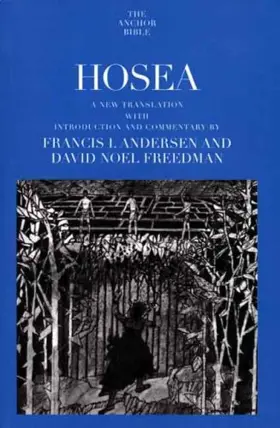

Hosea
Pages
720
Publisher
Yale University Press
Published
1980
ISBN-13
9780300139693
Hosea, volume 24 in the Anchor Bible series of new, book-by-book translations of the Old and New Testaments and Apocrypha is a collaboration by world-renowned scholars Francis I. Andersen and David Noel Freedman. The authors' treatment of Hosea consists of:
Introduction: A review and rethinking of Hosea research that offers a fascinating interpretation of the prophet's life and work.
Translation: Based on one of the oldest of prophetic writings, this new translation of Hosea is unique insofar as the literary integrity of the text is scrupulously adhered to. Notes: For both scholar and general reader there is cultural and linguistic information which sets each passage within the sociohistoric context of eighth century B.C.E. Hebrew vocabulary, syntax, and poetic language are examined in an effort to confront one of the most obscure sections of biblical literature.
Introduction: A review and rethinking of Hosea research that offers a fascinating interpretation of the prophet's life and work.
Translation: Based on one of the oldest of prophetic writings, this new translation of Hosea is unique insofar as the literary integrity of the text is scrupulously adhered to. Notes: For both scholar and general reader there is cultural and linguistic information which sets each passage within the sociohistoric context of eighth century B.C.E. Hebrew vocabulary, syntax, and poetic language are examined in an effort to confront one of the most obscure sections of biblical literature.
Collections
This book appears in the following featured collections.
- Best Exegetical Commentaries by Jim Rosscup
- Ultimate Commentary Collection: OT Technical by John Glynn
- Favorite Advanced OT Commentaries by Jeremy Pierce (parableman)
- Best Advanced OT Commentaries by Jason Gile
- Old Testament Advanced Commentaries by Moore Theological College Journal: Societas
- Building an OT Commentary Library by Invitation to Biblical Interpretation (Kostenberger & Patterson)
Reviews
The best Hosea scholarship you will find.
Most complete and best commentary on Hosea that I've come across
Francis Andersen and David Noel Freedman's 720-page AB (1980) is my favorite in-depth commentary from a more critical perspective. Andersen is a moderately critical evangelical, and Freedman is more toward the liberal end in comparison, but this work is a bit more moderate than some older commentaries (and in comparison with Macintosh below). Until Macintosh came along, this was the fullest Hosea commentary in print in English, and it does feel overwhelmingly detailed for those who just want a commentary for the sake of teaching through the text. It's especially helpful in text critical work, poetic elements of this prophecy, and the historical and cultural background. They treat the book largely as a unified work, compiled by reformers in the 7th century from materials going back to the actual prophet Hosea. Andersen's concerns include theology, but it doesn't get as much attention in this commentary as it could. Andersen and Freedman's work is highly respected across the theological spectrum. Though it's slightly more academic in focus than Garrett and McComiskey, it does not use Hebrew font and is thus easier to follow for those without Hebrew skills. It is a lot more detail, however, and it doesn't include the expositional or applicational elements that the above three commentaries do contain to some extent. Several reviewers complain about Freedman's syllable-counting metrical analysis of the poetry.
[Full Review]
For those seeking an exhaustive commentary on Hosea, there is probably no better place to turn than Andersen and Freedman's massive 720 page commentary. Although written from a slightly critical perspective, this work remains a necessary resource for those doing in-depth study of the book.
[Full Review]
Detailed commentary with attention to literary unity and style.
[Full Review]





